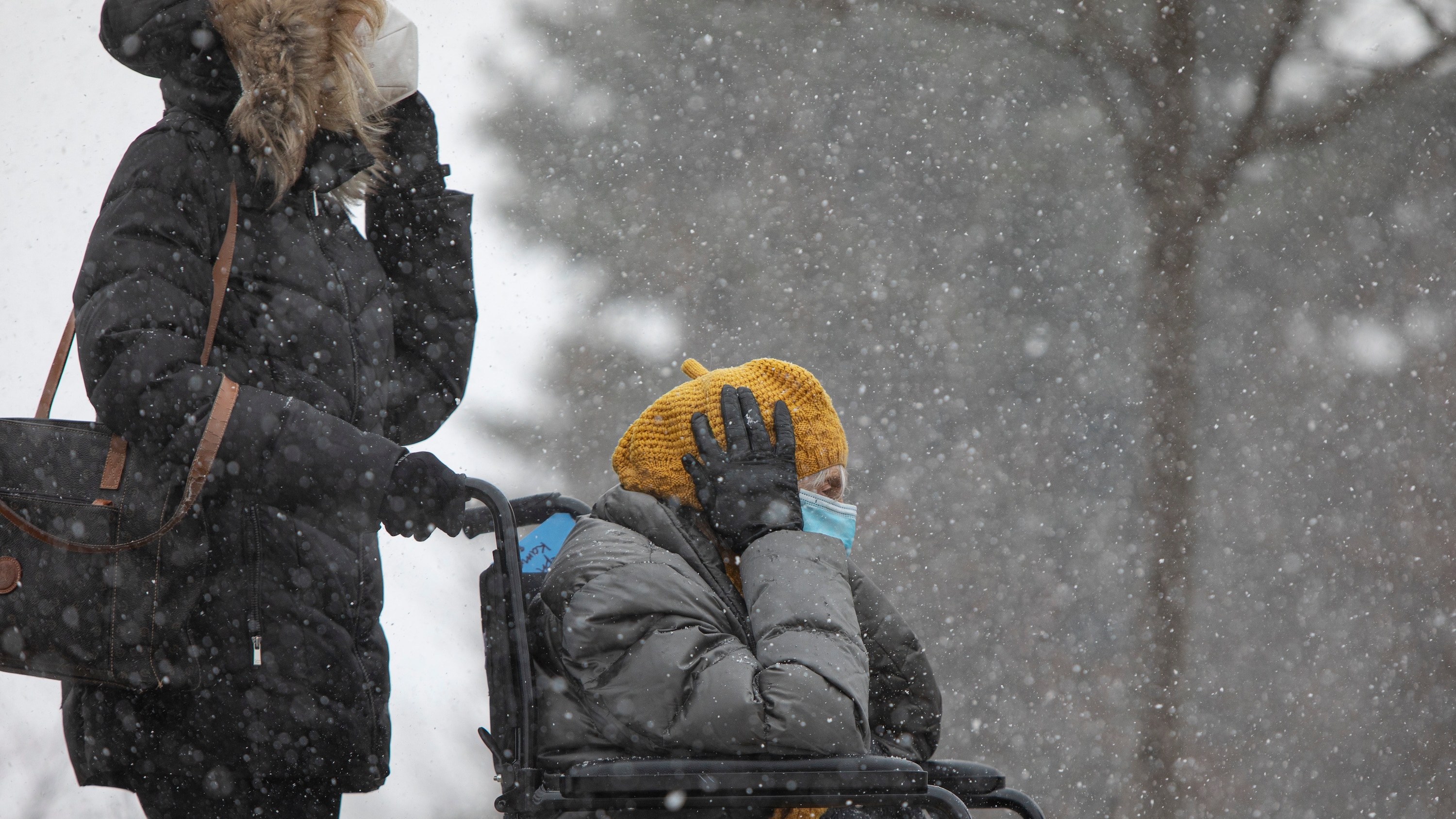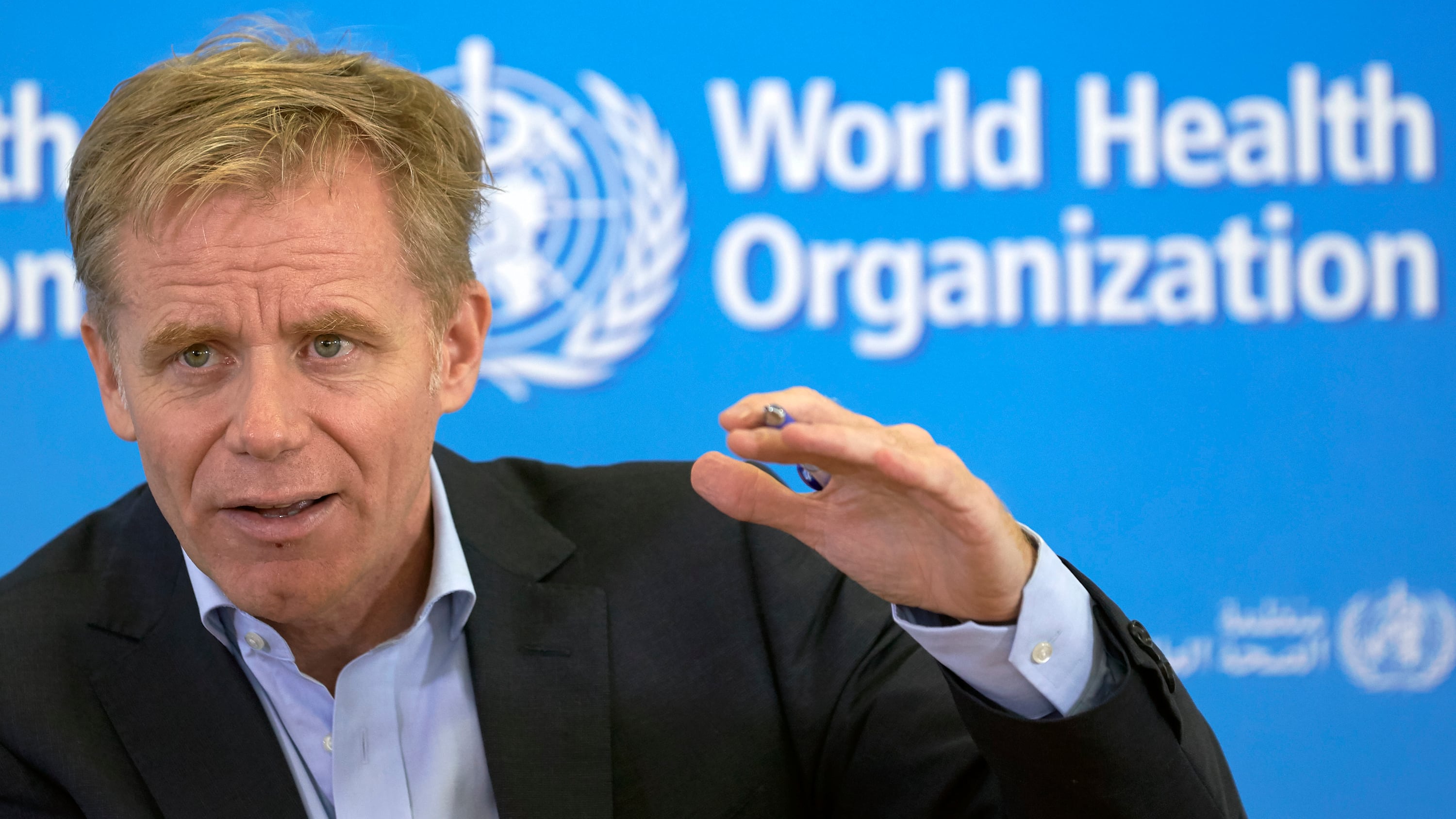Ontario is moving the Sarnia-Lambton region into lockdown on Monday after a recent spike in COVID-19 cases. The province is also adjusting capacity limits for weddings, funerals, and religious services, rites or ceremonies held in regions currently in the lockdown category.

The latest:
- Trudeau cool to the idea of vaccine ‘passports’ for the post-pandemic world.
- Ontario moving Sarnia-Lambton into lockdown starting Monday.
- WHO approves emergency use for Johnson & Johnson COVID-19 vaccine.
- Canada adds 259,000 jobs in February, biggest increase since September.
- Ontario sees 1,371 new COVID-19 cases.
- Variants of concern cause more than 40% of new COVID-19 cases in Ontario, experts say.
- N.B. reveals vaccine rollout details, revised timeline for 1st and 2nd doses.
- Have a question about the coronavirus pandemic? You can reach us at [email protected]
Ontario is moving the Sarnia-Lambton region into lockdown on Monday after a recent spike in COVID-19 cases.
The government says it’s making the move in consultation with the region’s medical officer of health. According to a release from the province, Lambton Public Health’s case rate increased by 30.9 per cent, to 110.0 cases per 100,000 people, from March 3 to 9, “well above the provincial average.”
During the same period of time, the number of COVID-19 hospitalizations in the region have increased by 33.3 per cent, the province says.
The province also says it will move the Northwestern Health unit into the second-strictest “red” category of Ontario’s colour-coded pandemic framework. The Leeds, Grenville and Lanark District Health Unit will move into the “yellow” category.
WATCH | Ontario facing new surge in COVID cases due to variants, expert says:

Aggressive COVID-19 variants have the upper hand in Ontario, which is why the province needs to vaccinate as quickly as possible, said Dr. Peter Jüni of the Ontario COVID-19 Science Advisory Table. 3:15
The province is also adjusting capacity limits for weddings, funerals and religious services, rites or ceremonies held in regions currently in the lockdown category, including Toronto, Peel Region and the districts of Sudbury and Thunder Bay.
Effective Monday, those gatherings will be permitted to allow for up to 15 per cent total occupancy indoors, or up to 50 people outdoors.
- Peel health officials order Amazon to shut down shifts at Brampton site, have workers self-isolate
- Toronto residents 80 and older can start booking COVID-19 vaccine appointments today
“While the data shows that Ontario’s vaccine rollout is helping to save lives, the next few months are critical,” said Dr. David Williams, chief medical officer of health, in the province’s release.
“We all must remain vigilant and continue following public health advice and measures to prevent transmission, as variants of concern are continuing to become more prevalent throughout the province and threaten to undo all of the positive gains we have all worked so hard to achieve.”
A new dashboard from the province’s Science Advisory Table on Thursday tracks information about variants of concern in the province — including information about new cases linked back to those variants and the reproduction number.
Ontario reported 1,371 new cases of COVID-19 on Friday and 18 additional deaths. Hospitalizations stood at 676, with 282 COVID-19 patients in intensive care units.
Meanwhile, it was a second consecutive day of record-high vaccinations, with 43,503 doses administered yesterday. A total of 1,062,910 doses of vaccine have been administered in the province so far.
– From The Canadian Press and CBC News, last updated at 4:30 p.m. ET
What’s happening across Canada
WATCH | CBC’s Rosemary Barton breaks down the biggest criticisms of how Ottawa handled the pandemic and what the next challenges will be:

CBC’s chief political correspondent Rosemary Barton breaks down the biggest criticisms towards how the federal government handled the COVID-19 pandemic and what the next challenges will be. 2:18
As of 4 p.m. ET on Friday, Canada had reported 902,165 cases of COVID-19, with 30,571 cases considered active. A CBC News tally of deaths stood at 22,402.
Dr. Theresa Tam, Canada’s chief public health officer, tweeted before a briefing that as of Thursday evening, health officials had reported a total of 2,986 variant of concern cases, including:
- 2,728 cases of the B117 variant first identified in the U.K.
- 215 cases of the B1351 variant first reported in South Africa.
- 43 cases of the P1 variant first reported in tourists from Brazil.
According to Tam, the variant numbers have been highest in “Ontario, Alberta, British Columbia and Quebec, respectively.”
In Atlantic Canada, Nova Scotia reported one new case of COVID-19 on Friday, as did Newfoundland and Labrador. New Brunswick reported three new cases and one additional death. Prince Edward Island reported no new cases.
- Track how many people have been given the COVID-19 vaccine across Canada
In Quebec, health officials reported 753 new cases of COVID-19 on Friday and nine additional deaths. Hospitalizations stood at 550, with 106 COVID-19 patients in intensive care.
The update came a day after Premier François Legault on Thursday praised essential workers for their efforts and urged people to remember the lives lost in the pandemic — more than 10,500 in Quebec alone.
“We lost grandmothers, grandfathers, fathers, mothers, brothers, sisters, friends, and today, Quebec remembers these people that left us too soon,” he said at an event marking the one-year anniversary of the World Health Organization’s declaration of a global pandemic.
LIVES REMEMBERED: There will be no return to ‘normal’ for families of more than 22,000 Canadians who lost their lives in COVID-19 pandemic, says Simar Anand, who lost his father:

There will be no return to ‘normal’ for more than 22,000 Canadians who lost family in the coronavirus pandemic, says Simar Anand, whose community-minded father, Gurinder, died of COVID-19. 8:20
Simar Anand lost his father, Gurinder, to COVID-19 last year in Montreal. Anand spoke with CBC’s Suhana Meharchand on Thursday about the anguish of being apart after his father was hospitalized and waiting for a daily call to update the family on his status.
“We just didn’t know what kind of news we would get during those 15 minutes,” he said.
Anand, who described his father as an authentic man who engaged deeply with the community around him, said that for families in Canada who lost loved ones to COVID-19, there will be no return to “normal” after the pandemic.
“That normal will never come for them, because normal was with their loved ones,” he said. “We’ve lost a lot — not only as families but as a community.”
He said now is the time to make sure that, “whatever we do rebuild as a community is something that’s accessible to all.”
Across the North, there were no new cases reported in Nunavut on Friday — the fifth straight day with no new cases in the territory. Health officials in Yukon and the Northwest Territories had not yet reported updated figures for the day.
- ANALYSIS | Will the N.W.T. ever ’emerge wisely’ from COVID-19 restrictions?
In the Prairie provinces, Manitoba reported 104 new cases of COVID-19 and one new death on Friday, which was the one-year anniversary of the first cases of coronavirus in the province. This is the first time in more than three weeks that Manitoba has had a daily case count above 100.
Meanwhile, Saskatchewan reported 176 new cases and three new deaths on Thursday. In neighbouring Alberta, health officials reported 364 new cases of COVID-19 and five additional deaths on Wednesday.

British Columbia reported 569 new cases and three more deaths on Thursday, as the provincial health officer said she is now allowing up to 10 people to meet outdoors after nearly four months of restrictions that barred in-person gatherings between people from different households.
Dr. Bonnie Henry said restrictions on indoor gatherings and rules for restaurants, bars, retail stores and other venues remain in place.
– From CBC News and The Canadian Press, last updated at 4:30 p.m. ET
What’s happening around the world
WATCH | Benefits outweigh risks with AstraZeneca COVID-19 vaccine, experts say:

Despite some European countries temporarily halting use of the AstraZeneca-Oxford vaccine after 30 cases of blood clots, experts maintain it is still safe to use in Canada. 2:01
A World Health Organization expert advisory committee is currently looking at the AstraZeneca-Oxford COVID-19 vaccine after some countries paused distribution of it, but there is no reason not to use it, a spokesperson for the committee said on Friday.
Health authorities in several countries, including Denmark, Norway and Iceland, have suspended the use of the vaccine following reports of the formation of blood clots in some people who have been vaccinated.
Margaret Harris told a briefing that it was an “excellent vaccine” and that no causal relationship had been established between the shot and the health problems reported, calling the pause in use “a precautionary measure.”
“It’s very important to understand that, yes, we should continue to be using the AstraZeneca vaccine,” she said.
WATCH | WHO advisory committee probes AstraZeneca issues:

The World Health Organization says AstraZeneca’s COVID-19 vaccine is excellent but all ‘signals’ about vaccines must be investigated. 1:04
WHO’s global advisory committee on vaccine safety is currently reviewing the reports and will report on its findings, as it does with any safety issues, she said.
“It is very important we are hearing safety signals because if we were not hearing about safety signals, that would suggest there is not enough review and vigilance,” Harris said.
The AstraZeneca vaccine is the main shot in the early phase of a WHO-led global vaccine-sharing scheme COVAX that aims to distribute two billion doses this year, ensuring access for poorer countries.
Health Canada said on Thursday that it is aware of the reports out of Europe and “would like to reassure Canadians that the benefits of the vaccine continue to outweigh its risks.”
“At this time, there is no indication that the vaccine caused these events,” Health Canada said. “To date, no adverse events related to the AstraZeneca COVID-19 vaccine, or the version manufactured by the Serum Institute of India, have been reported to Health Canada or the Public Health Agency of Canada.”
- What Health Canada had to say about AstraZeneca use in Canada
WHO data shows that more than 268 million doses of COVID-19 vaccines from various developers have been administered worldwide, and no deaths have been found to have been caused by them, Harris said.
Separately, WHO on Friday approved the emergency listing of Johnson & Johnson’s COVID-19 vaccine, giving its seal of approval to expedite use, especially in countries with weaker regulatory agencies.
It is the third COVID-19 vaccine after the two-shot regimens of Pfizer-BioNTech and AstraZeneca-Oxford to receive backing from the WHO, and the first requiring just a single injection.
WATCH | WHO official on the advantages of the Johnson & Johnson vaccine:

The WHO says the Johnson & Johnson COVID-19 vaccine is easier to administer than some of the other vaccines because it requires only one dose and does not need to be stored at extremely cold temperatures. 0:54
Asked about the timing of emergency listings for China’s Sinopharm and Sinovac Biotech vaccines, Harris said reviews were now underway and approval would “probably” be given this month.
“We would expect by the end of March,” she said.
The European Medicines Agency, meanwhile, said product information for the AstraZeneca COVID-19 vaccine should be updated to note that cases of severe allergic reactions have been reported. The suggested update is based on a review of 41 reported cases of anaphylaxis, or severe allergic reactions, that were identified among 5 million people who received the AstraZeneca vaccine.
In a statement on Friday, the Amsterdam-based EU regulator said it concluded that “a link to the vaccine was likely in at least some of these cases.”
Such allergic reactions are a recognized rare side effect to numerous vaccines and have been reported for other COVID-19 vaccines, including the one made by Pfizer-BioNTech. The EMA authorized the AstraZeneca vaccine for use in all adults across its 27 member countries in late January.
The agency also said it is reviewing whether COVID-19 shots made by Pfizer, Moderna and AstraZeneca might be causing low levels of blood platelets in some patients, a condition that could lead to bruising and bleeding.
As of early Friday morning, more than 118.6 million people around the world had reported having COVID-19, according to a tracking tool maintained by the U.S.-based Johns Hopkins University. Of those, more than 67.1 million were listed as recovered. The global death toll stood at more than 2.6 million.
In Europe, Germany’s health minister said the country should prepare for “several very challenging weeks” amid a rise in coronavirus cases. Health Minister Jens Spahn told reporters in Berlin on Friday that “the situation remains tense,” as the country’s disease control centre reported 12,834 newly confirmed cases in the past day, and 252 new COVID-related deaths.
The head of the agency, Lothar Wieler, said Germany is “at the beginning of the third wave” of infections following surges in cases last spring and in the fall.

Spahn noted there has been a drop in serious illnesses and deaths among the elderly, as most people over 80 in Germany have now received a virus vaccine. He said Germany has managed to administer more than 200,000 first shots daily this week. As more supplies arrive, shots will be administered not just in special vaccine centres but, from mid-April, also in doctors’ practices, said Spahn.
In Africa, South Africa’s health minister has said the country’s rollout goals for vaccinations may need to be changed because of supply issues. The country had aimed to have 65 per cent of people vaccinated by the end of the year, the Mail & Guardian reported. The mass rollout effort is still set to begin in April, Dr. Zweli Mkhize said — though he did not offer a firm date.
Mozambique, meanwhile, expects to receive 1.7 million more doses of COVID-19 vaccines by May from various bilateral sources.
In the Asia-Pacific region, India has registered its worst single-day jump in coronavirus cases since late December with 23,285. The sharp spike is being attributed to the western state of Maharashtra.
India has so far reported more than 11.3 million cases, the world’s second-highest after the United States. Infections have been falling steadily since a peak in late September, but experts say increased public gatherings and laxity is leading to the latest surge.
The increase is being reported in six states, including Maharashtra where authorities have announced a weeklong lockdown in the densely populated Nagpur city next week. The vaccinations there will continue.
WATCH | COVID-19 cases rise in India amid religious festival and vaccine hesitancy:

One of the world’s largest religious festivals is taking place in India and public health officials are worried. Not only is the country a COVID-19 hotspot, but vaccine hesitancy is high and experts say many people falsely believe the country has attained herd immunity. 2:17
Mayors have decided to reimpose a seven-hour night curfew in the Philippine capital region of more than 12 million people amid a spike in coronavirus infections, which forced dozens of villages to be placed back under police-enforced lockdowns.
Authorities would enforce the 10 p.m. to 5 a.m. curfew for two weeks starting Monday in Metropolitan Manila, where most cases in a new surge of infections have been reported this week, said Benhur Abalos, who heads the Metropolitan Manila Development Authority.
In the Americas, Chile’s President Sebastian Pinera has announced a raft of new measures aimed at helping middle class families stay afloat amid a new wave of coronavirus contagions that has sent swaths of the country back into lockdown.
Hospitals in Brazil’s main cities are reaching capacity, health officials warned, triggering tighter restrictions on Thursday in its most populous state.
In the Middle East, Iran remained the hardest-hit country, with more than 1.7 million recorded cases of the virus and a death toll of more than 61,000.
– From Reuters, The Associated Press and CBC News, last updated at 2 p.m. ET
